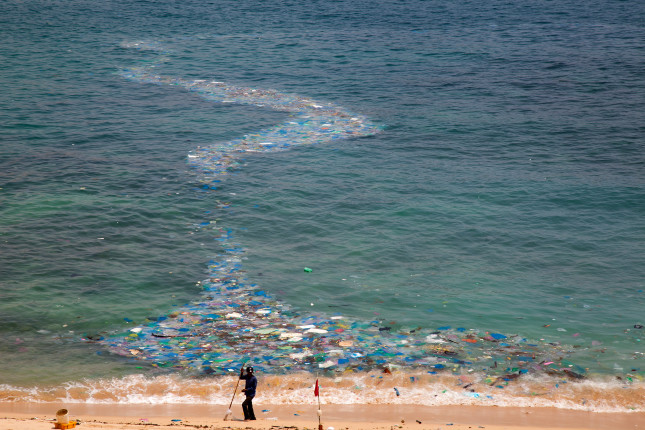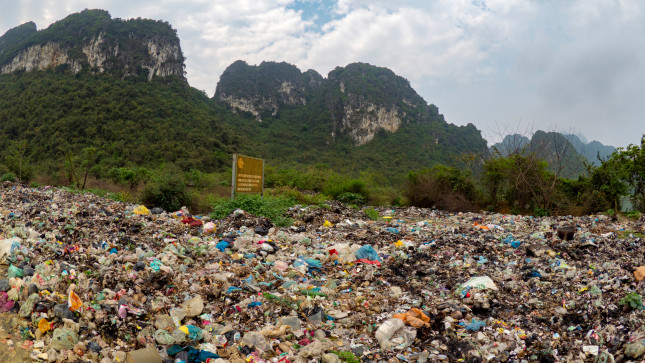
In December 2020, Vietnam’s Prime Minister Nguyễn Xuân Phúc signed the country’s National Action Plan for Management of Marine Plastic, setting an ambitious goal for the government to reduce marine plastic litter by 75 percent by 2030. Recent surveys indicate that plastics are the most prevalent and dangerous form of waste choking Vietnam’s beaches and waterways. Whether polystyrene, discarded nets, or mismanaged single-use plastics, these items are not just an eyesore, but they imperil the local ecosystem and fishing industry in Vietnam.
To complement the National Action Plan, Vietnam has a draft extended producer responsibility (EPR) law that would mandate companies to recycle packaging based on the volume produced. Under the law, companies can organize their own recycling or help fund a Vietnam Environment Protection Fund that will finance expansion of municipal recycling. But it is impossible to gauge progress on the national plan and EPR law, or even chart a path forward on plastic waste reduction, without a strong understanding of how much mismanaged plastic waste the country is generating. While plans are in place for the Ministry of Natural Resources to coordinate a national effort to build such a baseline, one Vietnamese metropolis, Can Tho, has spearheaded its own local analysis that could be a template for the country.
Can the city of Can Tho take on its plastic challenge?
With a growing population of approximately 1.25 million, Can Tho is the largest city in the Mekong Delta. Its location in the delta and proximity to Ho Chi Minh city has made it a trading hub, particularly for agricultural products. Outside of trade, the city’s intertwining canals and floating markets attract tourists from around the world, and serve as a major source of plastic pollution in Vietnam. Can Tho, along with Ho Chi Minh City, Hanoi, Haiphong, and Da Nang accounted for 22 percent of the country’s total population in 2017, and 70 percent of the country’s total waste generation.
Thus, we at Ocean Conservancy were thrilled when Can Tho leaders agreed to join Urban Ocean’s first cohort of 11 cities. Urban Ocean, which includes Ocean Conservancy, Resilient Cities Network, and The Circulate Initiative, is a first-of-its-kind partnership that brings together civil society actors, leading academics, financial institutions, and private sector leaders to develop, share, and scale solutions to the ocean plastics crisis.
The first step of the Urban Ocean program is for the city and its partners to generate local data of the plastic waste problem following the Circularity Assessment Protocol (CAP). CAP was developed by University of Georgia’s New Materials Institute and Circularity Informatics Lab. CAP builds a snapshot of a city’s circular materials management and recycling systems (including for plastic) to aid governments to effectively design and invest in a circular materials management system that keeps usable materials in use, rather than leaking into the environment where they cause harm.

Photo Credit: Illegal rubbish dump in a national park north of Vietnam, courtesy of Mike Workman/Shutterstock.com.
Despite the challenges presented by the Covid-19 pandemic, the Can Tho city government and its Can Tho University implementation partner, the DRAGON-Mekong Institute, pressed forward with the program. Within the first year, the city completed its baseline assessment. The partners released their report findings (in Vietnamese) in August 2021, adding to a growing collection of CAP reports from other Urban Ocean cities.
The Can Tho data offered city officials insights into investments, policies and dialogues they could pursue to reduce plastic waste. The report highlighted:
- All the tobacco, beverage, and personal care products sampled had domestic Vietnam manufacturers, meaning that engaging the private sector and implementing the new enhanced responsibility law might be easier than if the city had to negotiate with manufacturers overseas.
- Consumers have an appetite for addressing the pollution problem and may be receptive to public awareness campaigns about how to sort waste more efficiently or to adopting reusable rather than single-use options.
- Increasing the number of local waste bins with sorting instructions may also discourage litter.
The report also identified challenges that the city and its partners could prioritize in future policy, as well as business and community action.
- 100 percent of candy and personal care products and 83 percent of all popular products from convenience stores are packaged in multilayer plastic film sachets, which are not recyclable. This mirrors the growing sachet problem in Southeast Asia and globally.
- A lack of clear policies on the use of biodegradable products, higher costs for plastic alternatives, and the convenience of plastic items have led to fewer vendors and stores offering alternatives in Can Tho city.
- The dependence on incineration might be hampering sorting and recycling in Can Tho.
- A large proportion of the plastic waste discovered was from tobacco products. Tackling tobacco-related waste would mean simultaneously addressing addiction.
Putting Plastic in the Past
In the next few months, Can Tho will work closely with the Resilient Cities Network to articulate and develop planning concepts for the city’s most pressing priorities that the report helped identify. We are looking forward to seeing the results and hope to make these aspirations a reality in 2022.
Soon we will also be able to compare Can Tho’s results with two other major Vietnamese cities that Ocean Conservancy has partnered with: Hanoi and Da Nang. Separate from the Urban Ocean program, these cities will also complete a CAP assessment to create a baseline for their decision-making. Completing this assessment in several different locations throughout the country will drive better decisions at the national level informed by extensive data. The assessments will complement the already groundbreaking work of the Vietnamese government to complete and implement its National Action Plan and EPR Law to address marine plastic.
Vietnam is one example of how communities can come together to diagnose their issues and accelerate meaningful change at the local level. We hope this is just the beginning for Vietnam and look forward to them sharing their insights throughout the region and the world.
Keri Browder serves as Ocean Conservancy’s Cities Project Director, bringing more than ten years of sustainable development experience supporting various projects in the fields of governance, water and sanitation, conservation, and circular economy across Africa, Asia, Latin America, and the United States to the role. To learn more about Ocean Conservancy’s work in Vietnam, please visit our webpage here.
Sources: Borgen Project, Circulate Initiative, IUCN, Ocean Conservancy, Resilient Cities Network, University of Georgia, Urban Ocean, VietNam Breaking News, Vietnam National Administration of Tourism
Lead Photo Credit: Plastic waste stranded on the beach at Cam Ranh, Vietnam, courtesy of Andreas Rose/Shutterstock.com.

 Despite the challenges presented by the Covid-19 pandemic, the Can Tho city government and its Can Tho University implementation partner, the DRAGON-Mekong Institute, pressed forward with the program. Within the first year, the city completed its baseline assessment. The partners released their report findings (in Vietnamese) in August 2021, adding to a growing collection of CAP reports from other Urban Ocean cities.
The Can Tho data offered city officials insights into investments, policies and dialogues they could pursue to reduce plastic waste. The report highlighted:
Despite the challenges presented by the Covid-19 pandemic, the Can Tho city government and its Can Tho University implementation partner, the DRAGON-Mekong Institute, pressed forward with the program. Within the first year, the city completed its baseline assessment. The partners released their report findings (in Vietnamese) in August 2021, adding to a growing collection of CAP reports from other Urban Ocean cities.
The Can Tho data offered city officials insights into investments, policies and dialogues they could pursue to reduce plastic waste. The report highlighted:
 A Publication of the Stimson Center.
A Publication of the Stimson Center.







